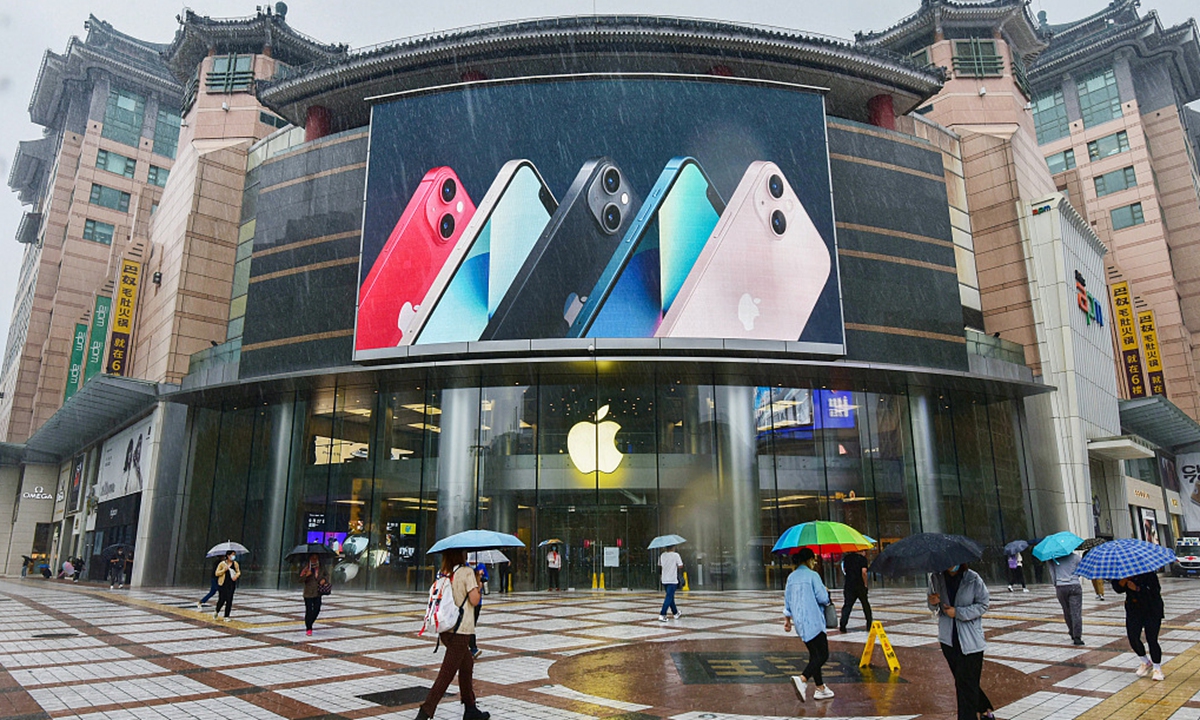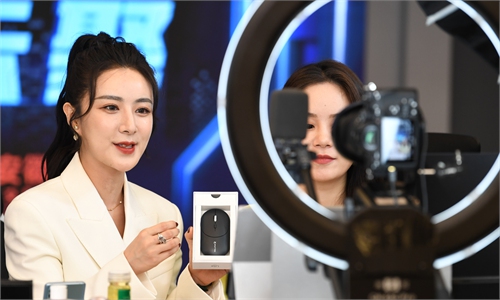
On September 24, 2021, people walk past an apple store in Wangfujing, Beijing, with iPhone 13 series advertisement on a big screen. Photo: CFP
In a first for Chinese authorities, East China's Zhejiang Province issued guidelines to help regulate commercial endorsements on Tuesday. The move comes after celebrity endorsements have caused many disputes such as Chinese-Canadian singer Kris Wu's endorsement of kitchen appliance maker Vatti and actress Zhao Liying's endorsement of a health product.
The guidelines, which summarize current advertising law and add some details that current laws do not cover, were posted to the official website of Zhejiang's Market Administration on Tuesday. According to the post, the guidelines aim to protect the legal rights of consumers, celebrities and companies.
Two of the 20 articles in the guidelines stipulate that celebrities must use products before they endorse them and that stars will be held jointly and severally liable with advertisers if they endorse false advertisements that harm consumers' legal rights.
Several big cases involving celebrity endorsements have made headlines recently.
China's well-known stand-up comedian Li Dan was fined more than 870,000 yuan ($134,347) for an ad for women's underwear insulting to women, Beijing authorities announced in August.
According to the announcement, Li was also in violation of endorsing a product that he had not used himself.
Some stars' endorsement of health or cosmetic products have also been involved in fake advertising cases.
In 2014, a Beijing resident sued former NBA player Yao Ming, claiming that the healthcare product endorsed by the athlete did not live up to its claims that it could improve memory and vision, the Beijing Youth Daily reported.
The guidelines also outline the limits of endorsements. Stars are not allowed to endorse for medicine, medical instruments or health foods.
The document also outlines the rights of companies as more celebrities have been expelled from the entertainment industry because of immoral or illegal behavior.
"Stars should follow up on the products or services they represent. If there is any problem, stars should take remedial measures such as rescinding the endorsement contract and issuing personal statements according to the situation. If stars are trapped in a scandal, they should also take the initiative to negotiate with the endorsement company to terminate the endorsement contract and cease the advertising contract," the guidelines said.
Celebrities Kris Wu and Zheng Shuang had many commercial endorsements in effect before they were forced from the entertainment industry due to scandals.
Wu was detained for suspicion of rape after an investigation by the People's Procuratorate in Beijing's Chaoyang district in August, and his studio was embroiled in a contract dispute with Chinese kitchen appliances brand Vatti, which had hired Wu as its spokesperson.
The guidelines also said that if stars' rights are violated, such as using their image without permission, they should report or sue the violators in order to protect their rights.
"Not only traditional advertising industry has such a problem, but the commercial live streaming is also troubled by some false promotions by celebrities. I hope the guidelines can be promoted to other places in China soon so that the chaos in stars' endorsement and live streaming that aims at selling goods can be improved," one consumer surnamed Du who had purchased low-quality products in the live streaming because of promotion from one celebrity told the Global Times.
Zhu Wei, a communications researcher at the China University of Political Science and Law, told the Global Times that the policy about the live streaming industry is being improved.
"Now what livestreamers said in the streaming should be reserved for three years as a proof when consumers ask for defending rights," he noted. And he added that all commitments of livestreamers to consumers about commercial integrity should be carried out.


